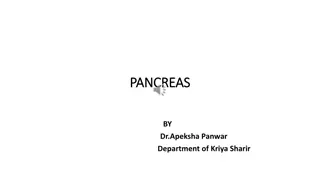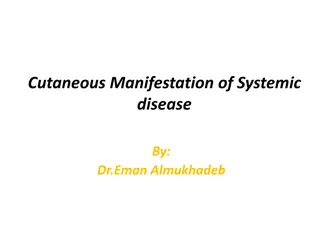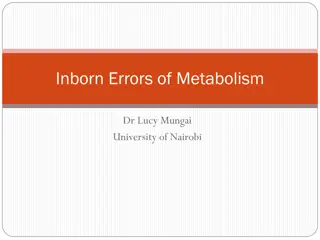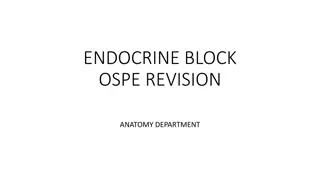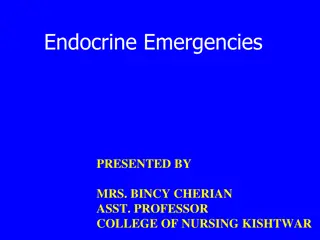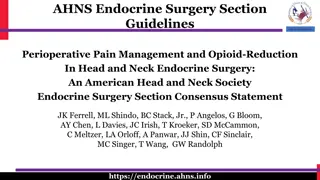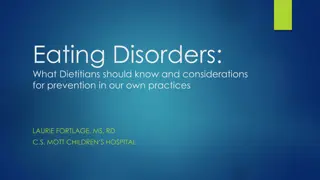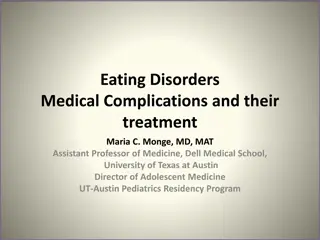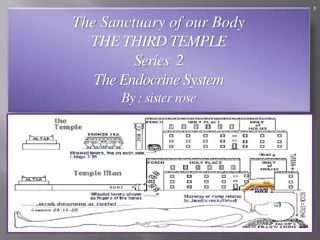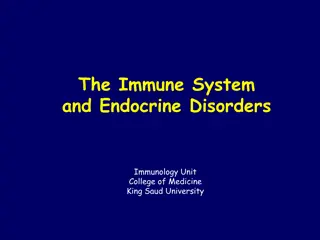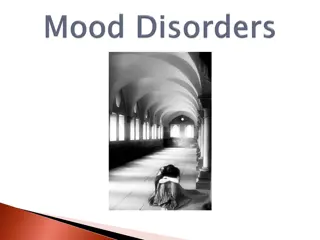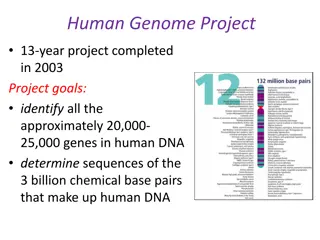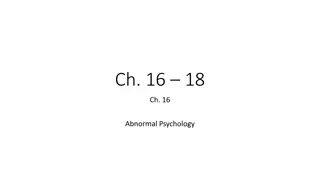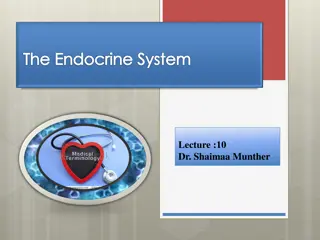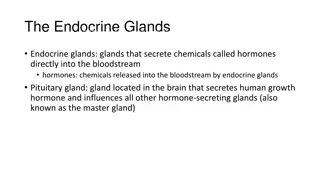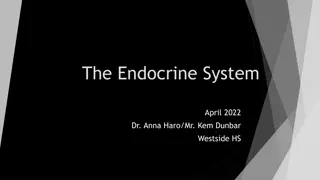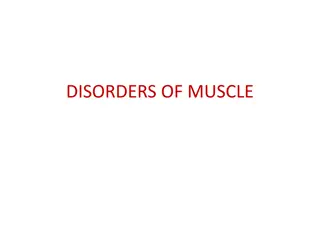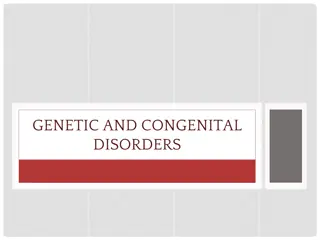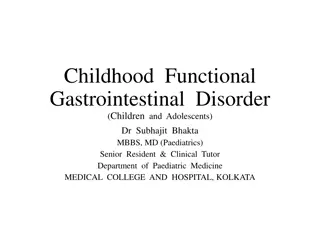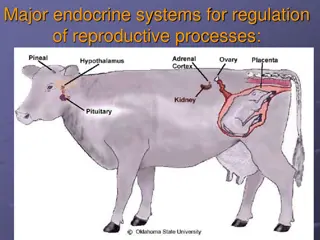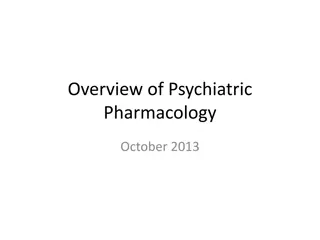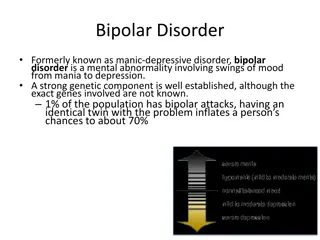Gynecological disorders
Common gynecological disorders including menstrual disorders and abnormal uterine bleeding. Find out about the nursing role in diagnosing and treating these disorders.
3 views • 22 slides
Understanding Diseases Associated with Homeostasis in Endocrine, Nervous, Immunological, and Genetic Levels
Exploring diseases related to disruptions in homeostasis at endocrine, nervous, immunological, and genetic levels, focusing on conditions like hormone imbalances and metabolic disorders such as growth hormone deficiency and diabetes. Learn about the impact on health and the body's intricate regulato
5 views • 38 slides
Comprehensive Overview of Pancreas Function and Structure
Pancreas is a vital organ in the abdomen with dual exocrine and endocrine functions. As an exocrine organ, it secretes digestive enzymes and bicarbonates into the duodenum for food breakdown. In its endocrine role, the pancreas regulates blood sugar levels by secreting insulin, glucagon, somatostati
1 views • 16 slides
Cutaneous Manifestations of Systemic Diseases: Endocrine Disorders and Diabetes Mellitus
Explore the cutaneous manifestations of systemic diseases, particularly focusing on endocrine disorders like diabetes mellitus. Learn about the dermatologic signs associated with conditions such as hypothyroidism, hyperthyroidism, Addison's disease, and Cushing syndrome. Discover specific manifestat
0 views • 88 slides
Overview of Human Genetic Disorders
Human genetic disorders encompass a range of conditions, from recessive disorders like cystic fibrosis to dominant disorders such as Huntington's disease. Examples include cystic fibrosis, Huntington's disease, and sickle-cell anemia. Understanding genetic disorders involves research and awareness o
0 views • 10 slides
Overview of Anxiety and Related Disorders
Anxiety disorders, such as PTSD, panic disorders, phobias, agoraphobia, and OCD, are characterized by varying degrees of fear and distress. Anxiety is a normal response to danger, but when it becomes chronic, it can lead to debilitating conditions. PTSD occurs post-trauma, panic disorders involve in
1 views • 42 slides
Understanding Somatic Symptom Disorders, Conversion Disorders, and Dissociative Disorders
Somatic symptom disorders manifest as physical symptoms without apparent cause, while conversion disorders involve specific physical symptoms incompatible with medical conditions. Illness anxiety disorder involves interpreting normal sensations as disease symptoms. Dissociative disorders lead to a s
1 views • 41 slides
Understanding Inborn Errors of Metabolism and Metabolic Disorders
Inborn Errors of Metabolism (IEM) are genetic disorders that disrupt metabolic pathways, leading to substrate accumulation or product deficiency. These disorders can be classified based on toxic accumulation, protein metabolism, carbohydrate intolerance, lysosomal storage issues, energy production d
0 views • 29 slides
Understanding Co-occurring Mental and Physical Health Conditions
Co-occurring mental and physical health disorders are prevalent and require an integrative multidisciplinary approach for effective assessment and treatment. This holistic approach helps address the complexity of managing multiple disorders in an integrated healthcare setting. Through a multi-direct
1 views • 37 slides
Overview of Human Endocrine System in Life Sciences Presentation
This content provides a detailed examination guideline for understanding the human endocrine system in the field of life sciences. It covers essential topics such as the difference between endocrine and exocrine glands, hormone functions, gland locations with functions, and key terminology related t
1 views • 17 slides
Endocrine Block OSPE Revision - Anatomy Department Presentation Slides
Explore this set of presentation slides prepared by the Anatomy Department for Endocrine Block OSPE Revision. The slides cover essential topics related to endocrine anatomical structures and functions, providing a comprehensive resource for revision and review.
0 views • 11 slides
Understanding Glands: Endocrine and Exocrine Systems
Glands play a crucial role in the body by producing and releasing substances for specific functions. Endocrine glands release hormones directly into the bloodstream, while exocrine glands secrete substances through ducts onto bodily surfaces. Different types of exocrine glands, such as sweat glands,
3 views • 22 slides
Understanding Endocrine Emergencies and Diabetes Mellitus
The endocrine system plays a crucial role in regulating various bodily functions through hormone release. This presentation by Mrs. Bincy Cherian delves into endocrine emergencies, specifically focusing on Diabetes Mellitus. It explains the differences between Type I and Type II diabetes, their clin
3 views • 28 slides
Understanding Functional GI Disorders: A Comprehensive Overview
Functional GI disorders encompass a range of conditions affecting the gastrointestinal system, such as irritable bowel syndrome and disorders of the gut-brain interaction. These disorders are characterized by no structural abnormalities but are influenced by factors like motility disturbance, viscer
0 views • 42 slides
AHNS Endocrine Surgery Section Guidelines: Perioperative Pain Management and Opioid Reduction
The American Head and Neck Society Endocrine Surgery Section provides consensus statements on perioperative pain management and opioid reduction in head and neck endocrine surgery. Addressing the opioid addiction crisis, the expert panel offers guidelines on pain management strategies, opioid prescr
0 views • 18 slides
Understanding Genetic Disorders and Their Impact on Health
Genetic disorders are caused by abnormalities in genes or chromosomes, leading to various health conditions. Inherited disorders can be passed down from parents to children, affecting physical makeup and processes in the body. In India, there is a high prevalence of genetic disorders, particularly i
1 views • 12 slides
Understanding Eating Disorders: Types, Signs, Effects, and Recovery
Eating disorders are mental disorders characterized by unhealthy eating habits and can have severe physical and psychological consequences. This article explores the definition of eating disorders, signs to look out for, different types such as Anorexia Nervosa, Bulimia Nervosa, Pica, and Purging Di
0 views • 10 slides
Understanding Eating Disorders: Insights for Dietitians
Eating disorders are complex neurobiological conditions that are not merely about control or weight management. These disorders can affect individuals of all genders, body sizes, and socioeconomic backgrounds. Dietitians play a crucial role in identifying, assessing, and treating eating disorders, a
0 views • 41 slides
Understanding Eating Disorders: Medical Complications and Treatment
This presentation by Dr. Maria C. Monge covers the common eating disorders in teenage patients, potential medical complications, and the role of the medical team in treatment. It includes definitions of disorders like Anorexia Nervosa, Bulimia Nervosa, and Binge Eating Disorder according to DSM-5 cr
0 views • 60 slides
Exploring the Endocrine System as the Third Temple of our Body
Delve into the fascinating connections between the endocrine system and biblical references, likening its functions to the operations of the Tribe of Asher. Discover how this system, composed of glands producing hormones, impacts growth, metabolism, and sexual development. Explore the intricate netw
0 views • 24 slides
Understanding the Interplay of the Immune System and Endocrine Disorders
Explore the intricate mechanisms of immunological damage to endocrine glands, focusing on disorders like Graves disease, Hashimoto's thyroiditis, type I diabetes, and Addison's disease. Delve into the association of autoantibodies with pathogenic and diagnostic significance, uncovering the complexit
0 views • 33 slides
Understanding Neurodevelopmental Disorders in Childhood and Adolescence
Neurodevelopmental disorders in childhood and adolescence encompass a range of conditions including intellectual disabilities, communication disorders, autism spectrum disorder, and attention deficit/hyperactivity disorder. These disorders impact cognitive development, adaptive functioning, and comm
0 views • 30 slides
Understanding Sleep Disorders: Classification and Diagnosis
Sleep disorders encompass various conditions affecting sleep patterns and quality. They are classified into categories such as insomnia, sleep-related breathing disorders, central disorders of hypersomnolence, circadian rhythm sleep-wake disorders, parasomnias, and sleep-related movement disorders.
0 views • 32 slides
Understanding Grief and Depressive Disorders: A Comparative Analysis
Grief and depressive disorders share similarities but also have distinct differences. Grief is a universal emotional state following loss, while depressive disorders involve prolonged mood disturbances. The stages of grief include denial, anger, bargaining, depression, and acceptance, with intervent
0 views • 79 slides
Understanding Genetic Disorders and the Human Genome Project
The Human Genome Project, completed in 2003, aimed to identify all human genes and DNA sequences. Genetic disorders, like autosomal disorders and Huntington's disease, can result from mutations at different levels, affecting single genes, chromosomes, or multiple genes. Albinism and cystic fibrosis
0 views • 37 slides
Endocrine Potpourri: Adrenal Insufficiency and Incidentalomas - Case-Based Review
This endocrine potpourri covers various cases involving adrenal insufficiency, adrenal crisis, adrenal incidentalomas, and patient education. It includes a detailed case presentation, treatment guidelines for adrenal crisis, patient education on adrenal insufficiency, and evaluation of adrenal nodul
0 views • 62 slides
Understanding Abnormal Psychology: Disorders, Symptoms, and Treatments
Explore the world of abnormal psychology through the lens of different disorders like depression, anxiety, and phobias. Learn about the definitions of abnormal behavior, DSM-V classifications, and various types of psychological disorders. Delve into the complexities of mental health conditions such
0 views • 39 slides
Understanding the Endocrine System: Key Concepts and Functions
The endocrine system, consisting of glands that release hormones into the bloodstream, plays a crucial role in regulating various body processes like metabolism, growth, reproduction, and stress response. Key glands include the pituitary, thyroid, pancreas, adrenal, ovaries, and testes, each produci
0 views • 34 slides
Overview of Classification of Psychiatric Disorders
Psychiatric disorders are illnesses with various manifestations that impact functioning due to disturbances in biological, social, genetic, and other factors. Two key classification systems, ICD-10 and DSM-5, categorize over 200 types of psychiatric illnesses. The ICD-10 includes categories like org
0 views • 18 slides
Understanding How Hormones Interact: The Endocrine System
The endocrine system comprises glands that release hormones into the bloodstream, influencing various bodily functions. Key glands include the pituitary, pineal, thyroid, pancreas, gonads, and adrenal glands, each playing a crucial role in regulating metabolism, growth, stress response, and reproduc
0 views • 5 slides
Understanding the Endocrine System: Hormones, Glands, and Regulation
The endocrine system, comprising glands such as the pituitary, thyroid, pancreas, and more, produces hormones that regulate various bodily functions. These hormones target specific cells with receptors, influencing metabolism, growth, energy usage, and more. By understanding how hormones interact wi
0 views • 12 slides
Understanding the Endocrine System: Functions, Organs, and Disorders
The endocrine system, essential for bodily functions and growth, consists of key parts such as the hypothalamus, pituitary gland, thyroid gland, and more. It helps maintain homeostasis and can be affected by environmental factors like drugs and stress, leading to conditions such as Cushing syndrome.
0 views • 9 slides
Understanding the Endocrine System: Functions and Glands Explained
Explore the intricacies of the endocrine system with a focus on its functions such as metabolism, growth, emotions, and more. Learn about key endocrine glands like the hypothalamus and pituitary, their roles in hormone regulation, and their impact on various bodily processes. Discover the significan
0 views • 17 slides
Overview of the Human Endocrine System
This presentation covers the terminology, differences between exocrine and endocrine glands, the location and functions of various glands in the endocrine system, and general information on how hormones coordinate the body's organs to maintain homeostasis.
0 views • 17 slides
Overview of Muscle Disorders and Muscular Dystrophies
The human body consists of over 600 muscles, divided into skeletal, smooth, and cardiac muscles. Diseases of skeletal muscle encompass myopathy, myositis, and muscular dystrophy. Muscle disorders are categorized into genetic muscular dystrophies, channelopathies, inflammatory myopathies, and endocri
0 views • 32 slides
Overview of Genetic and Congenital Disorders and Their Causes
Explore the terminology, causes, characteristics, and results of genetic and congenital disorders, as well as the disorders of single-gene inheritance. Learn about autosomal dominant disorders like Marfan Syndrome and Neurofibromatosis. Discover how single-gene disorders are inherited and their impa
0 views • 24 slides
Understanding Childhood Functional Gastrointestinal Disorders
Functional Gastrointestinal Disorders (FGIDs) in children and adolescents are characterized by chronic or recurring symptoms that cannot be fully explained by current structural or biochemical tests. These disorders emphasize the role of normal development in symptom presentation and the lack of evi
0 views • 46 slides
Endocrine Systems in Reproductive Regulation
The endocrine system plays a crucial role in regulating reproductive processes by secreting hormones that influence cellular activity. This system involves ductless glands like the hypothalamus, pituitary gland, and other endocrine glands working together in a feedback mechanism. Hormones of various
0 views • 19 slides
Overview of Psychiatric Pharmacology: A Comprehensive Guide from 2013
This presentation delves into the nuances of psychiatric pharmacology, exploring common psychiatric conditions, historical perspectives on medical treatments, categories of psychiatric medications, and principles of treatment. It also touches on mental illness definitions from DSM-IV-TR and DSM-V, a
0 views • 27 slides
Understanding Mental Health Disorders: Bipolar Disorder, Anxiety Disorders, & More
Exploring various mental health disorders such as Bipolar Disorder, Anxiety Disorders, Generalized Anxiety Disorder, Panic Disorder, and Phobic Disorders. Learn about their symptoms, prevalence, and impacts on individuals' lives.
0 views • 41 slides


